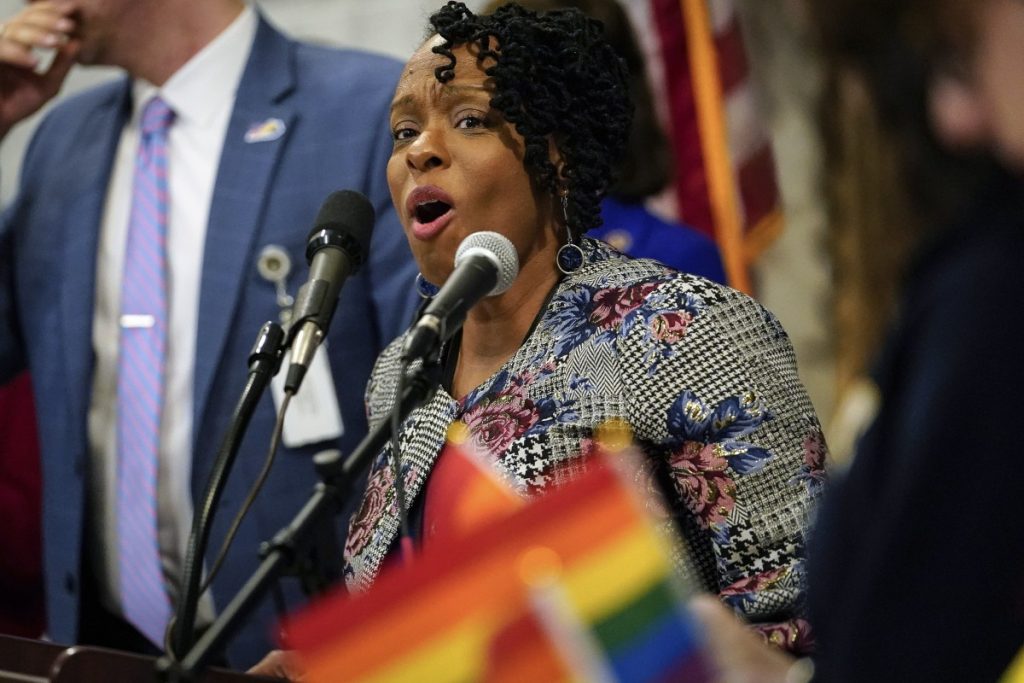When the Centers for Disease Control and Prevention introduced its Pregnancy Mortality Surveillance System in 1987, the number of pregnancy-related deaths per 100,000 live births in the U.S. was 7.2. In 2017, that number stood at 17.3.
The CDC acknowledges that the reasons for the increase in documented pregnancy-related deaths aren’t entirely clear. The more accurate reporting available in recent years is certainly a factor. Regardless, the rate of maternal deaths in this country remains alarmingly high, most explicitly evidenced by a comparison with other industrialized nations.
Last November, the Commonwealth Fund released the results of a study that found that among 11 of the most economically developed countries in the world, the United States has the highest maternal mortality rate (and is the only country among the 11 not to guarantee access to provider home visits).
More disturbingly still, the researchers found that a Black woman in the U.S. is more than twice as likely as a white woman to suffer a pregnancy-related death.
Responding to this racial disparity, U.S. House of Representatives members Alma Adams of North Carolina and Lauren Underwood of Illinois and Sen. Cory Booker of New Jersey last month introduced the Black Maternal Health Momnibus Act of 2021, calling for improved data gathering, investment in the social determinants of health, funding for community-based organizations and much more.
In Appalachia, Kentucky House of Representatives member Attica Scott – one of just two Black female legislators in the state – has introduced similar legislation. If passed, the Maternal CARE Act will monitor maternal deaths, provide Medicare coverage for doula care and mandate implicit-bias training for perinatal professionals.
Women throughout Kentucky of all races, Scott said, are suffering and dying unnecessarily during childbirth. She calls for “collective power across Kentucky to address maternal health.”
But with just a handful of days left in the state’s legislative session, her bill has failed to receive a hearing, for the second year in a row.
“Predictably enough, in Kentucky’s predominantly white, male, conservative legislature, self-identified ‘pro-life’ lawmakers who claim to care about mothers and families have introduced even more dangerous, restrictive abortion laws this legislative session,” Scott wrote in an op-ed piece.
“Anti-abortion lawmakers’ efforts to restrict reproductive health access have been proven to worsen pregnancy and maternal health outcomes, especially for women of color and those struggling financially,” she wrote. “In contrast, my bill offers my colleagues the opportunity to finally put their money where their mouths are and support mothers and families in a meaningful way.”
CDC researchers attest that about two-thirds of pregnancy-related deaths are preventable.
All of a Whole
Usha Ranji, associate director for Women’s Health Policy at the Henry J. Kaiser Family Foundation, calls racial and ethnic disparities in pregnancy-related deaths “one of the starkest health care disparities that we see in all of health care.”
Ranji and her coauthors of a KFF report on racial disparities in maternal and infant health underscore the numerous and varied sources of such disparities. These include limited access to health care for people of color. Black Americans are at greater risk than white Americans of experiencing heart disease and are less likely to have access to its care, and, Ranji said, heart disease is one of the leading causes of preventable maternal mortality.
The authors also write of “the major role social and economic inequities and historic and ongoing racism and discrimination play in driving disparities.”
The Congressional Momnibus Act calls for investment in housing, transportation and nutrition; funding for community-based organizations that work to improve maternal health outcomes and promote equity; and support for mothers with maternal mental health conditions and substance-use disorders. It calls for growing and diversifying the perinatal workforce.
Scott’s impetus for introducing the Maternal CARE Act in Kentucky was her own experience in a high-risk pregnancy and a growing awareness “that we’re doing a terrible job in Kentucky of maintaining data, that we’re doing a terrible job of addressing institutional and systemic racism and that our outcomes for moms and babies are shameful.”

Scott was also sponsor, in August, of Breonna’s Law, a response to the shooting death of Breonna Taylor by Louisville police officers. The bill would end no-knock warrants and heighten police accountability. It remains in committee.
In September, Scott was arrested while protesting Taylor’s death. Earlier this month, she called on U.S. Attorney General Merrick Garland to fully investigate the shooting.
Scott sees the Maternal CARE Act and Breonna’s Law as interwoven. “All of these issues are deeply connected,” she said. She urges that we understand “health and well-being and safe communities” as part of a whole.
One of Breonna Taylor’s last tweets, Scott noted, was that she was looking forward to being a mother one day.
“I want to make sure that as we’re fighting for justice for Breonna Taylor, we’re also making sure that women who might have the chance to be a mom, like Breonna wanted to be,” she said, “are able to do so in a healthy and safe way.”
Digging Deeper
Ariel Arthur, manager of the University of Kentucky’s Center for Health Equity Transformation and a maternal-health researcher, wants to ensure that women of color in regions where there are relatively few – in central Appalachia, for example – aren’t forgotten.

Arthur is taking a deeper dive into disparities data. Her research is designed to examine how the variables of race and geography interact. The objective is to better target resources “so that women don’t feel that they’re being erased” – those women who “don’t fit a typical definition of a rural Kentucky woman,” she said, who might ask, “‘Where am I in that data? My county’s not highlighted, but I’m still impacted by barriers to healthcare access … I still experience racism.’”
Women of color across Appalachia, Rep. Scott said, “are ignored over and over again. I have those conversations with some of my colleagues in the state House, about how some of the decisions that they’re making totally ignore the fact that they have Black people who live in their districts.”
“Appalachia is rich in representation,” she said, “it’s rich in diversity.” Legislation such as the Maternal CARE Act acknowledges that “Black mamas are giving birth in Appalachia just like they are in rural Western Kentucky and urban Louisville.”
Arthur wants healthcare systems to more thoroughly examine their role in perpetuating disparities and partner with women of color and community organizations to develop solutions that best fit the needs of a given community.
In a survey conducted in October by the Kaiser Family Foundation and The Undefeated, more than a third of Black women said that within the past year they had been treated unfairly when seeking health care for themselves or a family member.
Usha Ranji wants to see more racial and ethnic diversity in the healthcare workforce, including all areas of maternal care – “midwifery, doula care, physician care and postpartum care.” Rural areas in particular lack “the sort of diverse provider mix that we know really helps during the prenatal, labor and delivery and postpartum periods.”
Ranji cites the CDC’s HEAR HER initiative as a resource to help educate women and their support circles on pregnancy-related issues.
Remaining Hopeful
One of the bills in the Momnibus Act calls for investment in federal programs to address the unique risks for and effects of COVID-19 during and after pregnancy.
Ranji stresses that there’s much yet to be learned about COVID-19’s effect on pregnancy but says recent data suggests that COVID in pregnancy does raise the chances of a severe outcome or an ICU admission. And it’s well documented that people of color are being disproportionately affected by COVID-19.
Driven by a sense of urgency, Attica Scott makes no apologies for the challenge she’s laid before her fellow Kentucky legislators.
“I meant every word,” she said. “If you’re committed to making a woman carry a fetus and give birth, then you should be just as committed to making sure that she can have a healthy pregnancy and have a healthy birth.
“To me, it’s hypocrisy – that you’re going to want to force us to give birth, but yet you’re not doing much of anything to make sure that that birth can be healthy and safe for all moms.”
Of efforts at the Kentucky state Legislature to improve maternal-health outcomes, Scott said she grows more and more optimistic. Increasingly more health care professionals and organizations are reaching out to her, she said, having learned of the Maternal CARE Act, asking how they can lend their support.
“I remain hopeful because the people of Kentucky keep me hopeful and inspire me and have shown me by their actions that they’re extremely interested in this,” she said. “They want to see some action from the legislature.”
Editor’s Note: This article originally identified Rep. Attica Scott as the only Black female lawmaker in Kentucky’s legislature, but has been updated to note that she is one of two.



